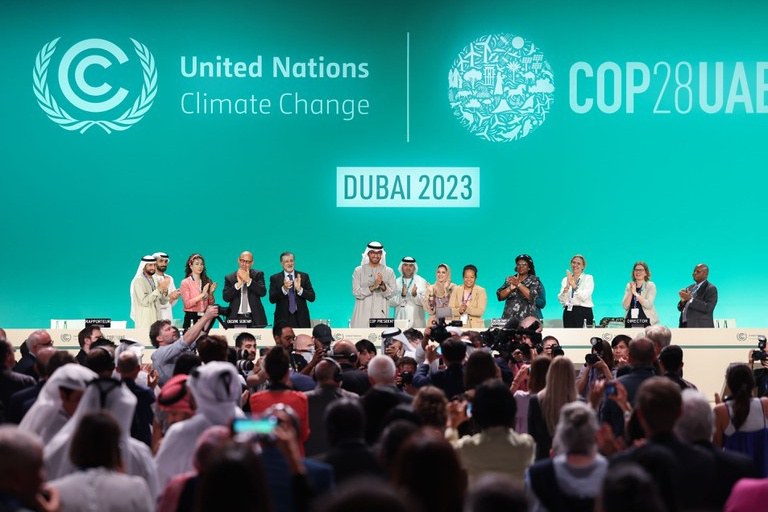Advanced cookie settings
To improve your experience on the platform and provide personalized services, we use cookies.
Notícias
COP 28

Final plenary session of COP28 in Dubai, United Arab Emirates. Photo: Christopher Pike/UNFCCC
COP28, the UN Climate Conference, ended on Wednesday (13/12) in Dubai, United Arab Emirates, with an agreement that for the first time proposes the "transition towards the end of fossil fuels". The text determines that countries change their energy systems "in a fair, orderly and equitable manner".
The commitment we have just made redirects our ambitions, but also our responsibilities. Our commitment in all its dimensions: mitigation, adaptation and means of implementation, aligned with 1.5°C, are now unavoidable"
Marina Silva, Minister of the Environment and Climate Change
The document also urges the 198 member countries of the convention to "accelerate action in this critical decade to achieve carbon neutrality by 2050, according to science".
"The commitment we have just made redirects our ambitions, but also our responsibilities. Our commitment in all its dimensions: mitigation, adaptation and means of implementation, aligned with 1.5 °C, are now unavoidable," said Minister Marina Silva at the summit's final plenary session.
The mention of the transition is part of the Global Stocktake, an inventory of the advances and gaps since the approval of the Paris Agreement in 2015 and the ways to contain global warming. The document identifies delays in complying with climate commitments, mainly by developed countries, and in financing for developing countries to adapt and make their transition.
The minister quoted President Lula's speech at the beginning of the conference, affirming that the meeting in Dubai could not end without the firm decision to "confront the debate on the slow pace of decarbonization of the planet, and work for an economy less dependent on fossil fuels".
Marina said that the next task is to align the means of implementation needed to ensure a just transition. To achieve this, she added, developed countries must take the lead: "It is fundamental that developed countries take the lead in the transition towards the end of fossil fuels and ensure the necessary means for developing countries to be able to implement their mitigation and adaptation actions."
ADAPTATION - The Global Stocktake also recognizes the need for support and investment, "including financial, with technology transfer and capacity, for efforts towards halting and reversing deforestation and degradation by 2030". The text highlights the need for sustainable development and poverty eradication and payment mechanisms for results from reducing deforestation, such as the Amazon Fund.
The conference also approved objectives for the Global Goal on Adaptation (GGA) and its structure, which will identify what needs to be done to increase resilience to climate change. Among other points, it recognizes the need for financing, technology and the leadership of indigenous peoples and traditional communities in the protection of nature.
COP28 also launched the Road Map to Mission 1.5°C, to reinforce international cooperation and the incentive for countries to present more ambitious climate targets at COP30. Belém, the capital of the State of Pará, has been confirmed as the host of the conference on Monday (11/12), in a plenary session that also confirmed Baku, in Azerbaijan, as the host of COP29.
The United Arab Emirates, Brazil and Azerbaijan will lead Mission 1.5°C, reinforcing their commitment to sustainable development and ending poverty. The partnership of the three countries, said Marina, seeks to do "in these two years what science tells us: the last window of opportunity to redirect our actions towards 1.5°C":
"The challenge of achieving Mission 1.5°C depends on everyone's effort, and especially on everyone's commitment to aligning their next NDCs with this objective," said Marina, referring to the English acronym for Nationally Determined Contributions, the climate targets of each country.
One of the key decisions of the conference was made on the first day (30/11), with the approval of the loss and damage fund. The mechanism was a long-standing demand of the countries most affected by climate change, such as island nations whose existence is threatened by global warming. So far, voluntary donations to the fund have exceeded US$ 700 million.
